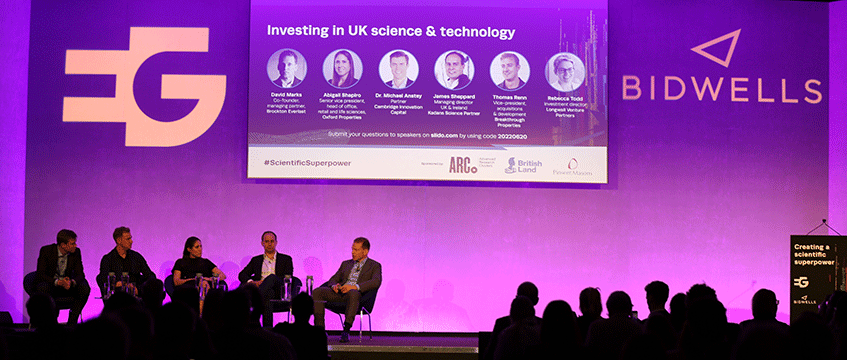Investors have been forced to rework and rethink their capital deployment strategies as global economic uncertainty takes its toll on the market, but have kept their confidence in the UK’s life sciences sector.
Although the UK remains the largest focus for venture capital investment in Europe, it has seen a slowdown in private funding this year when compared with 2021.
Speaking at EG and Bidwells’ Creating a Scientific Superpower conference this week, Michael Anstey, partner at Cambridge Innovation Capital, said: “When you look at UK venture-backed companies, all of those, with very few exceptions, have foreign investors coming in, mainly from the US. However, foreign investors will now be dealing with their own problems at home, and I think we may see them less keen to come and venture into the UK market.”
Experts from some of the largest investors in the life sciences market provided insights on their strategies in the UK over the next year.
Abigail Shapiro, senior vice president for European office, retail and life sciences at Oxford Properties, said the Canadian investor still has confidence in the UK life sciences market, as it pursues its long-term plan to become a lab owner-operator.
“We’ve got no concerns from the long-term perspective,” she said. “We expect some short-term hit on the occupational demand, similar to what we’ve seen during Covid. So, unless we absolutely have to rush, we’re probably going to be a little bit more patient around thinking about expansion and creating optionality for ourselves accordingly.”
In the meantime, Oxford Properties is set to focus on recently acquired assets including 310 Cambridge Science Park and Victoria House in Holborn, WC1.
Shapiro added: “We’re in a great position now. We’ve done some great acquisitions and continue to work on that [operational platform] product, which will come on board over the next two to four years. We are feeling optimistic and hope that these short-term trends will filter through the system by then.”
Thomas Renn from Breakthrough Properties said the joint venture between Tishman Speyer and Bellco Capital is taking a “science-based perspective” to investments during the current market uncertainty. He said: “At the moment we’ve been investing in what we describe as a ‘prime location’, where we can take an advantage of the supply-demand imbalance and take the risk off the table.”
James Sheppard from Kadans Science said the company is becoming more selective in types of buildings it brings to the market. He said: “At some point, we needed to make a decision: are we building a lab or an office? And once we go down the office rout, it is not that easy to go back or vice-versa.”
Kadans aims to reshape the UK market by moving away from what Sheppard called “super flexible” buildings, instead focusing on creating buildings that will suit particular types of businesses.
Cambridge Innovation Capital’s Anstey noted that labs are “much more desirable” investment assets than offices in the current UK life sciences environment. He said: “Thinking about space right now, I hope UK will not miss on its potential to become a leader in the life sciences industry.”
To send feedback, e-mail evelina.grecenko@eg.co.uk or tweet @Gre_Eve or @EGPropertyNews











